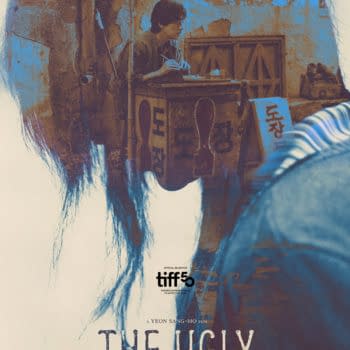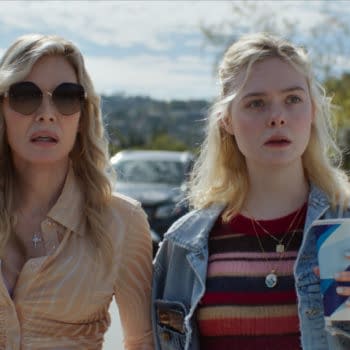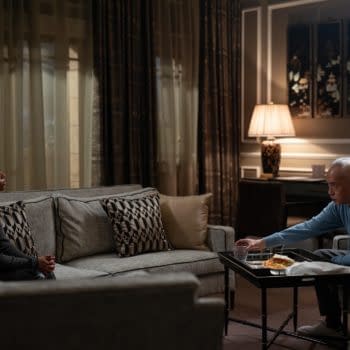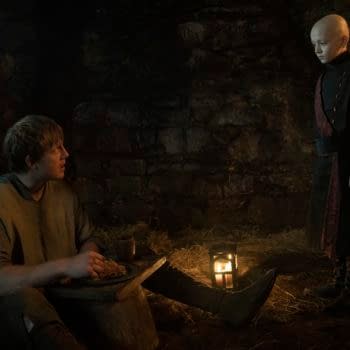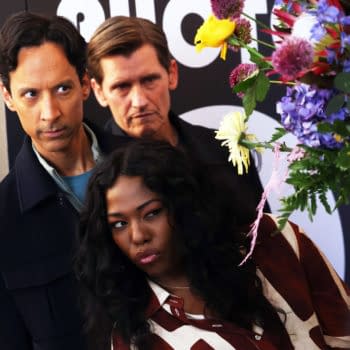Posted in: BBC, Disney+, Doctor Who, TV | Tagged: doctor who
Doctor Who: "The Story and the Engine" Deep Dive – Barbershop Stories
Doctor Who S02E05: "The Story and the Engine" is Inua Ellams' multilayered & deeply personal meditation on the show and the nature of stories.
This week's episode of Doctor Who, "The Story and the Engine," is a standalone episode set in completely modern-day Africa (recreated in Cardiff) and is not only a meditation on storytelling but also the very nature of the Doctor as a story. It gives Ncuti Gatwa an episode that fully explores and runs the gamut of his Doctor at last. It's about storytelling as myth, folklore, cultural memory and social bonding, written by talented playwright, poet and performer Inua Ellams, who's also using the story as a way to remember the Nigeria of his family.
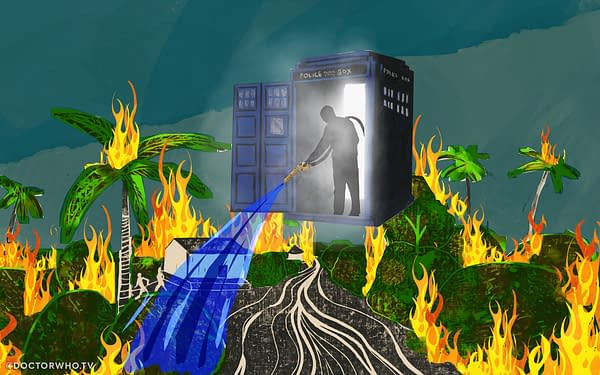
Doctor Who as Myth and Legend
The cold open features Omo (Sule Rimi), the owner of the barbershop, telling the story of how he met the Doctor, a magical wizard-like figure who appeared and saved his village from a fire when he was a child. The full version of that story is in prose on the official Doctor Who website, written by episode writer Inua Ellams. Omo, referring to the TARDIS as looking like a cupboard because there were never blue police boxes in Nigeria, is a subtle reference to the TARDIS being inspired by the CS Lewis's classic The Lion, the Witch and the Wardrobe.
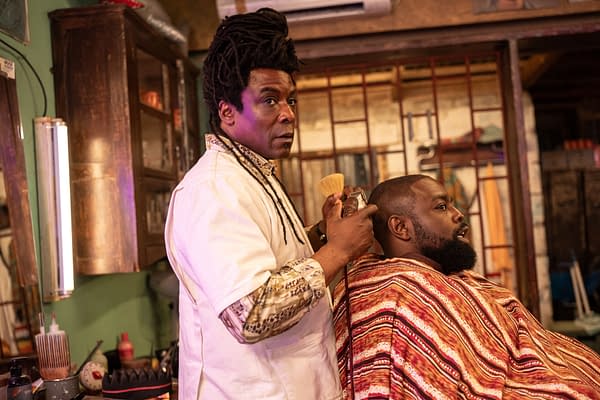
The Barbershop as a Sacred Space
The episode is a companion piece to Ellams' hit National Theatre play The Barbershop Chronicles. He also reveals that The Barber (Ariyon Bakare) is taking over Omo's barbershop and turning it into a trap to ensnare men. The energy from their stories violates the barbershop as a safe space. In African culture, the barbershop is a social space for men to not only talk and tell stories but also to pass wisdom between young and old, and learn to be men. You could read The Barber as a metaphor for Capitalism, exploiting and commodifying men's stories and experiences, their entire culture, for his own profit and power. The barbershop becomes a temple where the tithe is stories. The men have to keep paying in stories to stay alive.
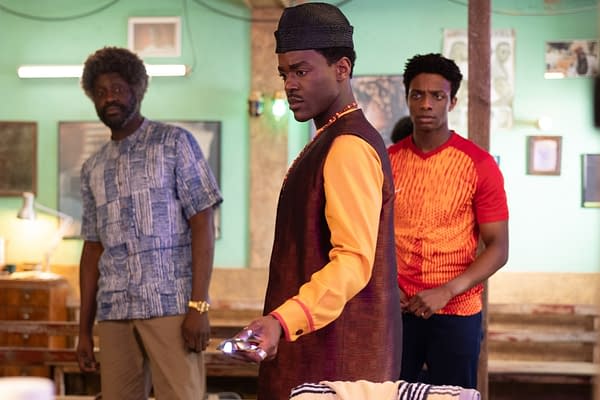
"The Story and the Engine" shows a side of The Doctor we rarely see – the lonely alien seeking community. Inua Ellams turns that into a metaphor for the immigrant's experience based on his own. The Doctor finds a place where he's accepted because of his skin colour and his charm. Ellams folds that into his own feelings when he returns to visit Nigeria every now and then, and the feel of Lagos and the barbershop in the story reflect his own nostalgia for the culture he originally grew up in but no longer lives in. The Doctor's hurt from Omo betraying his trust and using him as bait to save himself and the men from The Barber is almost child-like. Ellams shows how fear can turn good people into mobs who are willing to throw someone like The Doctor under the bus to save themselves, yet Momo knows The Doctor is a protector and a trickster who would find a way to save them. And The Doctor can get past his betrayal to forgive them.

The Nurse's Story – A Tale of Everyday Heroism
Belinda's story is that of a nurse who selflessly helps the frightened and helpless patients entering the hospital. She's willing to stand up to doctors when they miss details in their diagnosis. Her story was interrupted by being dragged into the Space and Time shenanigans of The Doctor, and she's desperate to get back to it. The Doctor treats her as his equal and has taught her some of the basics of using the TARDIS controls, and she shows up at the barbershop in time to not be taken prisoner but to help him find the solutions to defeat The Barber. This leads to…

Mrs. Flood Watch
Mrs. Flood (Anita Dobson) makes her obligatory cameo this week by showing up in the flashback to Belinda's everyday life at the hospital, picking up some medicine and behaving like a perfectly ordinary lady, which must have taken place before Belinda met The Doctor. Mrs. Flood doesn't say anything cryptic or give off villain vibes this week. It could be a scene from Holby City. Mrs. Flood might not really do anything here, but her appearance reminds us that she's still there as part of the tapestry of the story, and her story is yet to be revealed.
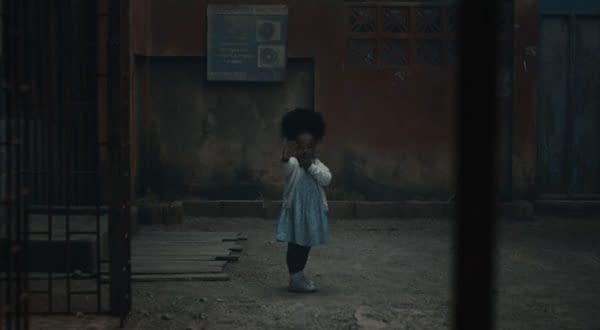
And speaking of hidden stories yet untold, that spooky child who points Belinda towards Omo's barbershop is Captain Poppy from last season's "Space Babies" – they even brought back the same baby, now a year older and can walk. She's going to have a lifetime paying side gig of attending conventions! Why was she there? What did The Doctor mean when he said "stories were spilling out"? Suddenly, "Space Babies" might turn out to be an essential part of the two-season arc.
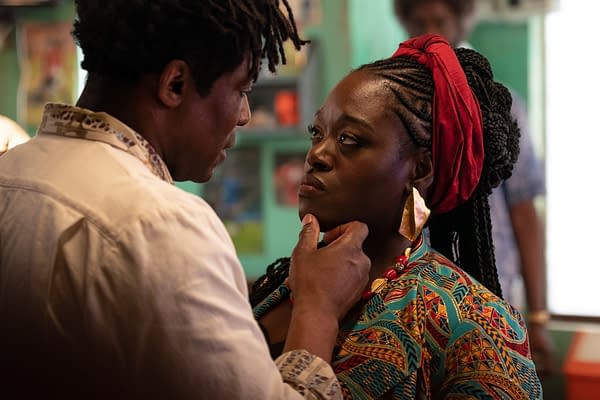
The Barber and The Daughter – Abused by a God
The gods are jerks. That has been one of the messages Doctor Who has pushed since the 1960s. They're imperfect since they're amplified reflections of people's aspirations and flaws, and the God of Stories is no different. The Barber is not a god but a former servant of the God of Stories, revealed to take on many forms in many cultures – Loki, Anansi, and so on. What The Barber wants is revenge against his god for abusing him and taking away his name and his agency. Abena (Michelle Asante), the daughter of the God of Stories, sides with The Barber and wants revenge on her father for hurting her. "Hurt people hurt people" might be a bit on-the-nose, but it's a lesson that Doctor Who wants to teach kids, since, as previous showrunner Chris Chibnall explained to Ellams years ago, "Doctor Who is a show for 8-year-olds that everyone can watch." The Barber, in his bitterness, wants to kill the gods, but The Doctor reminds him that to kill stories and gods is to kill humanity itself since both are tied together.
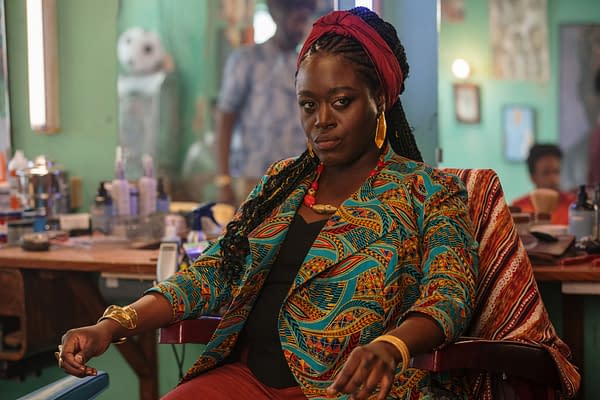
"The Barber and the God's Daughter" is its own story here, a fairytale heading for a tragic ending until The Doctor changes the outcome. The Barber and Abena are also a dark mirror to The Doctor and his companion. Abena has her own grudge against The Doctor because the latter was a fugitive a long time ago and wouldn't take her away from her abusive father.
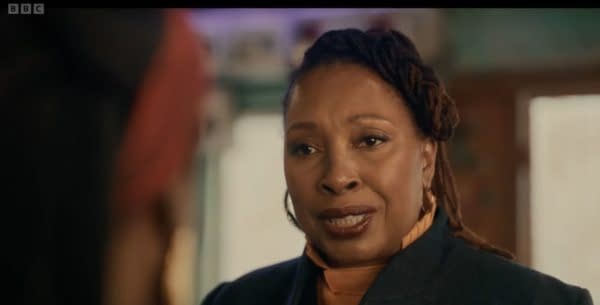
Jo Martin's cameo is the biggest surprise in the story, and not just a fan-baiting gimmick, but a use of Doctor Who continuity and lore acknowledging that "The Timeless Child" is still canon. She even says her story hasn't ended yet. The Doctor convinces Abena to turn against The Barber and hide a map to the maze in The Barber's engine in the cornrows she gives him, another instance of the personal meaning of cultural tools. That the engine, fueled by stories, powers The Barber's ship, which looks like a giant spider, is another reference to the god Anansi and the web, the tapestry of stories. Ultimately, The Doctor grants The Barber mercy, and he is no longer The Barber. He is given a new name and a new life. The Barber is a baddie who actually takes The Doctor's advice to stop badding and lives. A story that ends in forgiveness is incredibly rare these days.
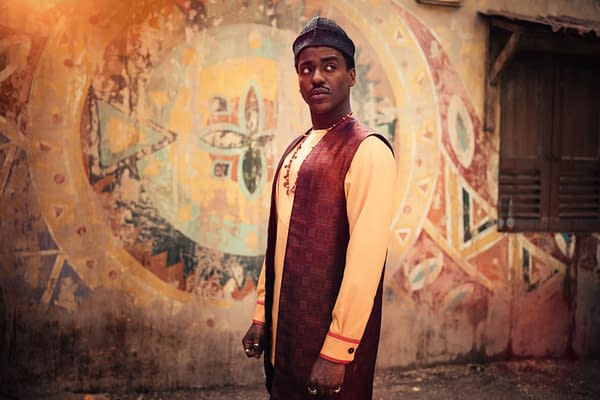
The Doctor is the Ultimate Story
It's rare for the biggest easter egg in the story to be the ultimate weapon that helps defeat the baddie – the Doctor himself is a never-ending story thanks to endless regenerations. A callback to past incarnations is a combination of geekish continuity callbacks and a weapon, including a welcome cameo from Jo Martin (who showed up to speak a new liine while past Doctors are seen in montage clips) as the Fugitive (and, according to canon now, the first Doctor that came before William Hartnell) whose rejection of Abena broke the latter's heart and sent her on a path of revenge. The montage of the previous Doctors is a callback to the first episode of Season Six. The stories that stay with us get told again and again with variations. It's kind of impressive that Jo Martin went all the way to Cardiff to get into costume to film literally one close-up. Because she understood the power of telling the story.
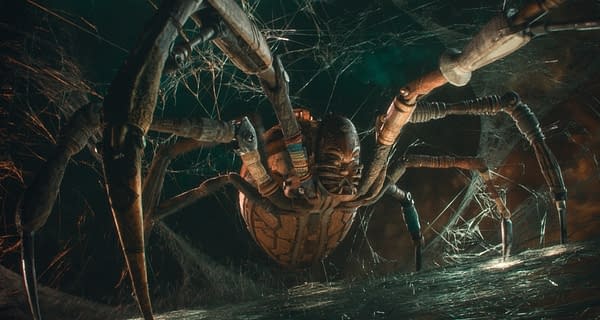
"The Story and the Spider" is very meta, but its whole structure and themes make it meta about meta since all stories here fold back to The Doctor. He uses his being The Doctor, using his story, to defeat The Barber. If stories are about power, then The Doctor is the most powerful story of them all. Ncuti Gatwa goes from child-like hurt and terror to brash and coldly rational to melancholy to swashbuckling hero.

The Doctor is Greater than a God – He's a Story, and Stories are Everything
Last season, The Doctor declared himself The God of Life to bring death to Sutekh, the God of Death, and there are hints again in "The Story and the Engine" that he might be a god, since he's eternal, neverending, but The Barber saw that his story is neverending. It is an endless cycle of regeneration at the end of each era. That makes The Doctor more powerful than any god. He's friends with some gods, which is the first time the series has mentioned that not all gods are total dicks. Gods need belief to continue to exist, or they become forgotten, even the God of Stories. Gods are stories, but not all stories are gods, and stories can be more powerful than gods. The Doctor would be loathe to be considered a god but acknowledges that he – or they – are a story. As long as people keep retelling a story, even changing or adapting it to their own tastes or the attitudes of the times, a story is never forgotten. Doctor Who is a prime example of that.
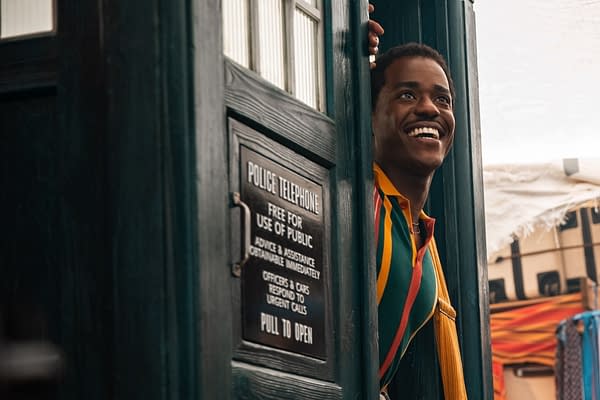
Doctor Who is a British creation cobbled together from pieces of other stories – HG Wells' The Time Machine, the TARDIS inspired by CS Lewis' The Lion, the Witch and the Wardrobe, the Boys' Own adventure, the stories frequently a retelling of other classic gothic, horror, and Science Fiction stories. The series manages to encompass virtually all stories with the exception of High Fantasy, but eventually, someone will get around to writing that too. What makes "The Story and the Engine" special is the way Inua Ellams writes a deeply personal interpretation of The Doctor and how the character is taken up by fans everywhere to be made their own.
Doctor Who: The Story and the Engine is now available on BBC iPlayer and BBC One in the UK and Disney+ outside the UK.



